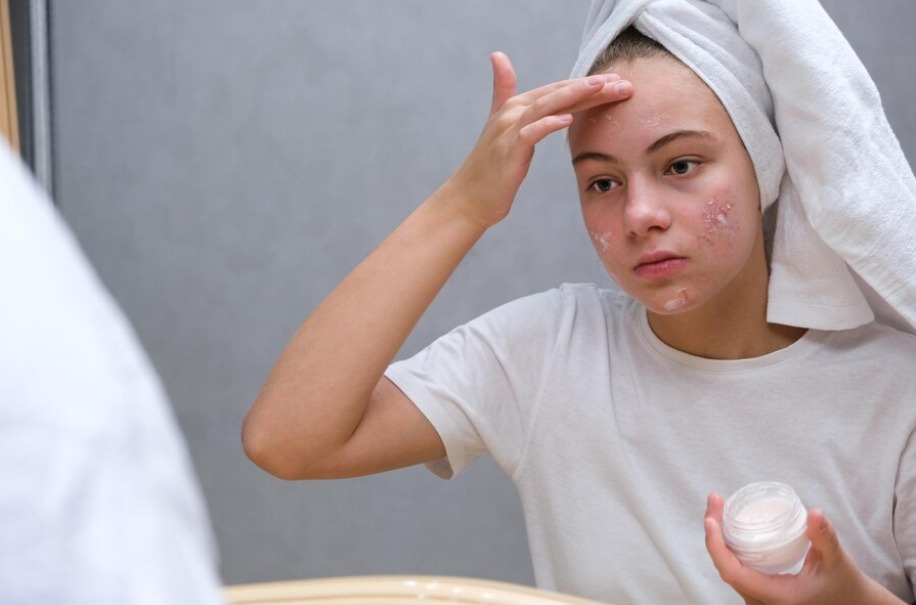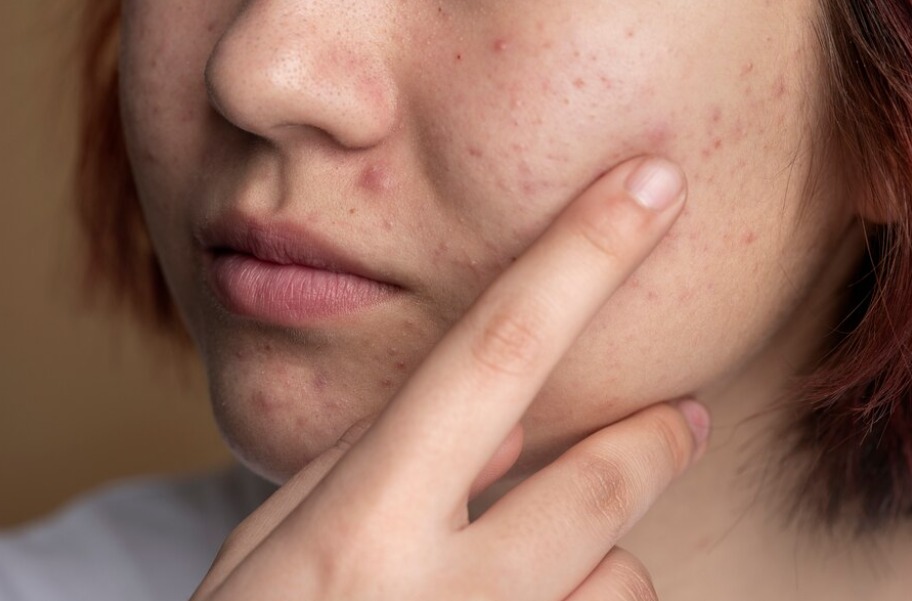Pimples, also known as acne, can have various causes and contributing factors. Here are some possible reasons why pimples may appear on the face:
Excess oil production: The skin naturally produces oil (sebum) to keep it moisturized, but excessive oil production can clog pores, leading to acne.
Clogged pores: When dead skin cells and oil accumulate in the pores, they can form a plug, leading to the development of pimples.
Bacterial infection: Propionibacterium acnes (P. acnes) is a type of bacteria that lives on the skin and can multiply in clogged pores, causing inflammation and acne.
Hormonal changes: Fluctuations in hormone levels, such as those that occur during puberty, menstruation, pregnancy, or when starting or stopping birth control pills, can trigger acne.
Genetics: A family history of acne can be one of the bigger reason of pimples on your face.
Certain medications: Some medications, including corticosteroids, lithium, and androgens, can contribute to acne development.
Diet: While the link between diet and acne is still debated, some research suggests that certain foods, such as dairy products and high-glycemic-index foods, may worsen acne in some individuals.
Stress: Stress can trigger the release of hormones like cortisol, which may exacerbate acne.
Cosmetics and skincare products: Certain cosmetics and skincare products, especially those that are oil-based or comedogenic, can clog pores and contribute to acne.
Environmental factors: Exposure to pollutants, high humidity, and sweating can exacerbate acne.
Friction or pressure on the skin: Rubbing or pressure on the skin from items like tight clothing, helmets, or backpack straps can contribute to acne development, especially in areas where there’s friction.
Poor skincare habits: Not cleansing the skin regularly or using harsh products can contribute to acne by allowing oil, dirt, and bacteria to accumulate on the skin.
Role of digestive system in clearing pimples:
Good digestive system plays a vital role in skin health. Every problem in body actually starts from the stomach, if the stomach is healthy then the body will be healthy. A strong digestive system helps in proper detoxification and nutrient absorption, which indirectly influence skin health. Here’s how strong digestion can help in clearing pimples:
Nutrient absorption: A healthy digestive system ensures that essential nutrients, such as vitamins, minerals, and antioxidants, are properly absorbed from food. These nutrients play a crucial role in maintaining skin health and reducing inflammation, which can help prevent and clear pimples.
Detoxification: Strong digestion supports the body’s natural detoxification processes, including the elimination of waste and toxins through the digestive tract. Efficient detoxification helps remove toxins that may contribute to acne and other skin issues.
Balancing hormones: Certain nutrients, such as zinc and vitamin A, are important for hormone regulation and can help balance hormone levels that may contribute to acne. Strong digestion ensures optimal absorption of these nutrients, which can support hormonal balance and clearer skin.
Reducing inflammation: A healthy gut lining and balanced gut microbiome can help reduce inflammation throughout the body, including in the skin. Chronic inflammation is associated with acne development, so maintaining a healthy digestive system can help mitigate inflammation and promote clearer skin.
Elimination of waste: Efficient digestion and regular bowel movements ensure timely elimination of waste and toxins from the body. Sluggish digestion or constipation can lead to toxin buildup, which may contribute to skin issues like acne.
We got to know about the importance of good digestion, but the question is how to improve digestive system. Here are some of the tips that one can follow to improve digestion.
Eat a balanced diet: Incorporate a variety of fruits, vegetables, whole grains, lean proteins, and healthy fats into your meals. Aim for a colorful plate to ensure you’re getting a wide range of nutrients.
Include fiber-rich foods: Fiber helps promote regular bowel movements and supports digestive health. Include foods like fruits, vegetables, whole grains, legumes, nuts, and seeds in your diet to increase your fiber intake.
Stay hydrated: Drink plenty of water throughout the day to help keep your digestive system running smoothly. Water helps soften stools and aids in the digestion and absorption of nutrients.
Limit processed foods and added sugars: Processed foods and foods high in added sugars can be hard on the digestive system and may contribute to digestive issues like bloating, gas, and constipation. I would suggest avoiding processed food as much as possible.
Include probiotic-rich foods: Probiotics are beneficial bacteria that support gut health. Include foods like yogurt, kefir, sauerkraut, kimchi, miso, and tempeh in your diet to help promote a healthy balance of gut bacteria.
Consider prebiotic foods: Prebiotics are non-digestible fibers that feed the beneficial bacteria in your gut. Include foods like garlic, onions, leeks, asparagus, bananas, oats, and barley in your diet to support the growth of probiotics.
Manage stress: Chronic stress can negatively impact digestion. Practice stress-reducing techniques such as deep breathing, meditation, yoga, or spending time in nature to help support a healthy digestive system.
Exercise regularly: Regular physical activity can help promote regular bowel movements and improve overall digestive health. Started doing exercise of your choice that help in improving digestion and overall health.
Get enough sleep: take at least 8 hours of sleep on daily basis. Insufficient sleep can contribute to digestive issue.
Strong digestion alone may not directly clear pimples, it plays a vital role in supporting overall health, including skin health. By promoting nutrient absorption, detoxification, hormonal balance, and inflammation reduction, strong digestion can contribute to clearer and healthier skin. However, it’s essential to remember that addressing acne often requires a multifaceted approach that may include dietary changes, skincare, stress management, and possibly medical treatments, depending on the individual’s needs. If you’re still struggling with acne, it’s a good idea to talk to a doctor or dermatologist for personalized advice and treatment options.
Skin care routine for clearing pimples:

For a skin care routine targeting pimples, it’s essential to focus on gentle cleansing, exfoliation, hydration, and using products that help control oil production and reduce inflammation. Here’s a basic skin care routine you can follow:
Cleanse: Wash your face twice a day with a gentle, non-comedogenic cleanser. Look for products labeled “oil-free” or “non-comedogenic” to avoid clogging pores. Avoid harsh cleansers or scrubbing too vigorously, as this can irritate the skin and worsen pimples.
Exfoliate: Exfoliation helps remove dead skin cells that can clog pores and contribute to acne. Use a gentle exfoliator 2-3 times a week to unclog pores and promote cell turnover. Look for exfoliators with ingredients like salicylic acid or glycolic acid, which can help reduce acne and improve skin texture.
Treat: Apply a spot treatment or acne medication directly to pimples to help reduce inflammation and speed up healing. Look for products containing ingredients like benzoyl peroxide, salicylic acid, or tea tree oil, which can help kill bacteria and unclog pores.
Hydrate: Even if you have oily or acne-prone skin, it’s important to use a lightweight, oil-free moisturizer to keep your skin hydrated. Look for moisturizers labeled “non-comedogenic” or “oil-free” to avoid exacerbating acne.
Protect: Apply a broad-spectrum sunscreen with SPF 30 or higher every morning, even on cloudy days. Sunscreen helps protect your skin from harmful UV rays and prevents post-inflammatory hyperpigmentation (dark spots) that can occur after pimples heal.
Avoid picking or squeezing: Resist the urge to pick or squeeze pimples, as this can lead to scarring and further inflammation. Instead, let pimples heal naturally or use spot treatments to help them heal faster.
Use non-comedogenic makeup: If you wear makeup, choose products labeled “non-comedogenic” or “oil-free” to avoid clogging pores. Be sure to remove makeup thoroughly before bed to prevent breakouts.
Maintain a healthy lifestyle: Eating a balanced diet, staying hydrated, getting enough sleep, managing stress, and avoiding smoking can all contribute to overall skin health and help prevent pimples.
Remember that consistency is key when it comes to managing acne-prone skin. It may take time to see results, so be patient and stick to your skin care routine. If you’re struggling to control your acne, consider consulting a dermatologist for personalized treatment options.
conclusion:
Clearing pimples requires a good skincare routine, diet, and lifestyle adjustments. By adopting a gentle skincare routine, eating a balanced diet rich in anti-inflammatory foods, prioritizing gut health, managing stress, and seeking professional advice when needed, you can effectively combat pimples and achieve clearer, healthier skin. Consistency and patience are key as you work towards your skincare goals.
Frequently asked question-
Can certain foods cause acne?
Until the link between diet and acne isn't fully understood, some individuals may find that consuming high-glycemic foods, dairy products, or foods rich in saturated fats can worsen acne.
Is it okay to pop pimples?
It's best to avoid popping pimples, as it can lead to further inflammation, infection, and scarring. Instead, use topical treatments or consult a dermatologist for safe extraction.
Does stress cause acne?
Stress can exacerbate acne by triggering hormonal changes that increase oil production and inflammation. Practicing stress-reduction techniques may help manage stress-induced acne flare-ups.
How long does it take for acne treatments to work?
The effectiveness of acne treatments varies depending on the severity of the acne and the type of treatment used. Some treatments may show improvement within a few weeks, while others may take several months to see significant results.
Can acne scars be treated?
Yes, acne scars can be treated with various dermatological procedures such as laser therapy, chemical peels, microneedling, or dermal fillers. Consult a dermatologist to determine the most suitable treatment option for your specific type of acne scars.

